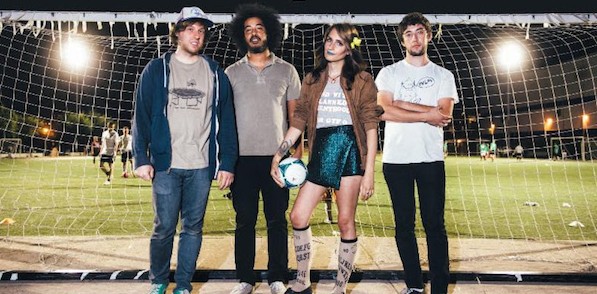Even if Speedy Ortiz didn’t have local roots, the band would still be a Pudding favorite. For starters, there’s the foursome’s smart spin on riff-crunching rock, their bar-setting commitment to creating safe, inclusive shows, and their regular use of media buzz to highlight important social causes. This week, they’re adding to that list by kicking off a tour to benefit the Girls Rock Camp Foundation, a national non-profit organization that distributes grants to programs across the country that empower girls through musical instruction and performance.
At first glance, Girls Rock camps are all about developing musical skills: girls who enter the program choose to learn drums, guitar, keyboard, bass, or vocals, then spend a week writing and honing songs in preparation for a performance. Below the surface, those band practices and related workshops encourage empowerment and teach media literacy. It all adds up to create a friendly, supportive space for girls to explore creative expression in a field that’s sometimes bogged down by stereotyping and sexism.
Speedy Ortiz’s music makes a perfect soundtrack for the cause. It’s sometimes classified as “slacker rock”, but genre slang aside, it’s anything but lazy; vocalist and guitarist Sadie Dupuis’ elaborate lyrics are all about stepping up to challenges, shaking toxic forces, and asserting independence. Add to that the band’s confident, catchy sound and you’ll get a musical equivalent to the Girls Rock mission. It’s empowering, thoughtful, and makes a statement while having fun.
The band’s interest in partnering with GRCF was sparked in part by Dupuis’ own experiences as a teen at Buck’s Rock, a similarly art-focused summer camp, where she described finding support in a diverse community that stood in contrast to the “total dudeville” she said she encountered at talent shows and battle of the bands contests. “Often girls aren’t learning how to work in a recording studio and getting to play guitar and learning from rock musicians who are women. I feel like I learned a lot as part of [Buck’s Rock], whether it was playing guitar, writing songs, working in the studio, or putting together a band and booking shows and printing t-shirts,” Dupuis said in a recent phone interview. “What a lot of the Girls Rock Camps do is similar kinds of programming, with the idea that girls often are introduced to that world much later in their lives because guitar and rock instruments in general are still perceived as a boy’s hobby, which I think is pretty backwards. People have been making a strong effort to change that which is great, because it’s a wonderful creative outlet for any kind of person.”
Both Dupuis and Nora Allen-Wiles, Executive Director of Girls Rock Camp Boston, aim to continue encouraging that creative outlet through the funds raised by the foundation. “You idolize musicians and artists, a very grand idea of a person. Somebody on stage is a very powerful thing to see, and you’re a fan, and all that stuff. And then throughout the week you realize that that’s something that’s actually attainable, that you’re becoming that person who’s going to be on stage, who has the power to entertain and to be the strong person for people to see, ” said Allen-Wiles. “Girls are taught that they shouldn’t be loud and they shouldn’t be doing crazy instrumental drum fills and making as much noise as possible. I think just that freedom to really express yourself… and to just really be yourself with other people and be loud and crazy and be really encouraged while doing that is really empowering for girls.”
Beyond writing and performing music, the camps also provide an opportunity for participants to learn about feminism and take a critical look at their favorite music videos and songs with a new perspective. “When you’re a kid and you’re getting into music, that’s the main period in which a band can really change your life,” said Dupuis. “When I go back to some of the ones that were really formative to me as a 13-year-old, I was really into heavy guitar stuff, and when I revisit a lot of that now it’s highly misogynistic. At the time I didn’t really think about it because I didn’t think of myself as the person that was considered the ‘shitty girlfriend’ in the song. You identify with the songwriter there, the protagonist, and you view yourself as one as well. I think as I got older I realized these protagonists aren’t viewing me in their shoes, these songs really aren’t for me and they sort of emotionally exclude me. That doesn’t mean I can’t listen to a lot of stuff I really loved as a kid and still get excited by it, but I like the idea of introducing songs that feature a wider view of who the protagonist or subject can be.”

